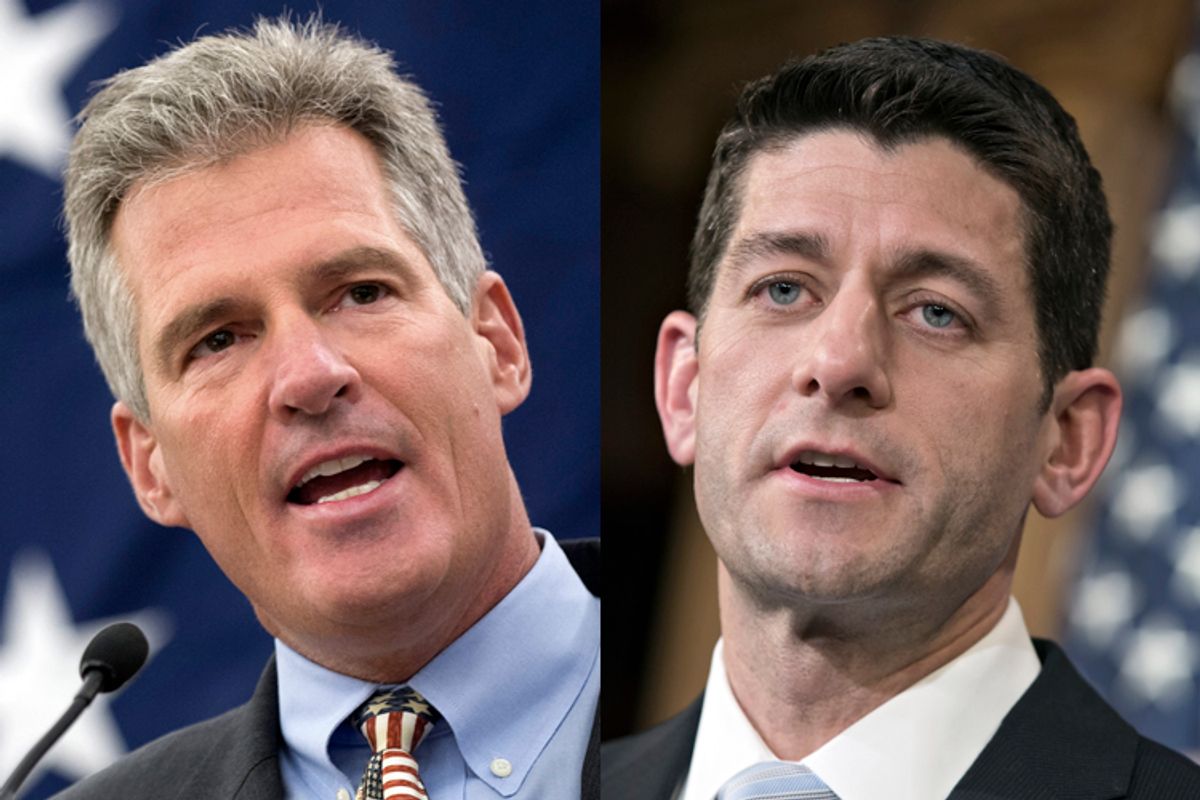There’s a budding movement of liberal commentators arguing that Democrats need to start fighting back on Obamacare or risk amplifying the electoral damage typically wrought on the president’s party during midterm elections. Kevin Drum, Greg Sargent and even Bob Shrum think that in the wake of the FL-13 special election, the party has to dust off and regroup before everyone starts taking it for a given that the president’s healthcare plan is political strychnine.
The question is: how? Right now the politics of the health law are difficult, but they’re certainly not unworkable. Sargent argues that the GOP’s “repeal Obamacare!” mania can be turned against them as people start to understand that repeal would cancel out their newfound benefits. Drum wants to know why the airwaves haven’t been flooded with ads highlighting the success stories of Obamacare. Both strategies have merit, but they put candidates in the position of crafting a positive message while acknowledging – explicitly or implicitly – the law’s shortcomings.
The goal is to come off as a credible proponent of a good, if imperfect, piece of critical legislation. But such strategies become difficult to implement when Democratic leaders try to put a high-gloss polish on Obamacare, which does little beyond making the Republicans’ job easier.
Nancy Pelosi told reporters yesterday that Obamacare is a “winner” for 2014, arguing that it will be a strong issue for Democrats in November. Lots can happen between now and Election Day, but at the moment, Obamacare just isn’t a “winner” for the party. A new Pew poll puts its approval rating at 40-53. The same poll found that the majority of people who disapprove favor fixing the law over letting it fail. Those are the people to target. They don’t think Obamacare is a winner, but they can be convinced it’s worth the effort.
From a messaging standpoint, a full-throated hosanna to Obamacare is arguably counterproductive. Reporters are already primed to deploy the trusty “Democrats in Disarray” storyline as it pertains to Obamacare and 2014, and Pelosi’s comments fed right into that by pitting herself against the rank-and-file members.
When a reporter asked why congressional candidates in competitive races seem to be either touting their attempts to fix the law or avoiding discussing it altogether, Pelosi shot back.
"You have to ask them -- the member, but I believe that it's a winner," she said.
The practical effect of calling the law a “winner” is that Republican operatives will happily portray Pelosi as out-of-touch and then get busy tying Pelosi to Democratic candidates across the country – the exact strategy they used in FL-13.
A little more finesse and exactness is required. It’s difficult, but doable, and luckily for the Democrats, the Republicans are unwittingly pitching in. Let’s go back to that Pew poll which found that most of the people who disapprove of Obamacare want to repair it rather than see it fail. The poll broke down the poll’s opponents by party and found that Republicans who disapprove of the law are basically evenly divided between wanting to see it burn (43 percent) and wanting to see it fixed (40 percent). This means there are lots of voters out there – more than a few of them Republicans – who see at least some virtue in Obamacare, and they can make things pretty uncomfortable for their repeal-minded candidates.
Paul Ryan, one of the most recognizable Republican faces in the country, caught a rebuke yesterday at a town hall meeting from constituent Michael Martincic who argued that whatever one personally thinks about Obamacare, it’s helping people like him. Martincic told ThinkProgress that Obamacare subsidies had cut his monthly premium by $500. “Whether it’s good, bad, or not, it got passed. It’s actually helping some people grow,” Martincic said.
Putative New Hampshire Senate candidate Scott Brown had an awkward encounter with Republican state legislator Herb Richardson who, after listening to Brown call Obamacare a “monstrosity,” explained that Obamacare saved him from financial ruin after he was hurt on the job. “Thank God for Obamacare!” Richardson’s wife helpfully exclaimed.
Moments like these throw the GOP’s “repeal and replace” strategy on Obamacare into confusion and give Democrats the chance to make the case that even if you’re not a fan of Obamacare, it is helping people and can be made better. In the current political environment, that’ll have a better shot than telling people who don’t believe it that Obamacare is a “winner.”



Shares